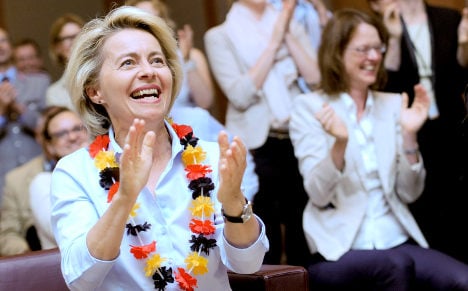"We will stop proceedings in good time before the start of the game," said SPD fraction head Thomas Oppermann on Monday night, referring to Thursday's match scheduled to start at 6pm.
The idea is to avoid a repeat of the scandal two years ago, when during Germany's Euro 2012 semi-final match against Italy an almost-empty parliament session passed a hugely unpopular bill allowing authorities to sell citizens' address details to businesses.
Much time and effort was wasted going back and changing the law again afterwards, when it was shown to be incompatible with Germany's strict data protection laws.
Meanwhile, both the German coach Joachim Löw and German-born USA coach Jürgen Klinsmann have insisted they will only be playing to win after facing repeated questions about whether the old friends may have struck a deal ahead of Thursday's face-off.
The United States' 2-2 draw with Portugal in Group G on Sunday has left Klinsmann's side level on four points with Germany heading into their final group game.
A draw in Thursday's match in Recife would see Germany qualify as group winners with the United States finishing runners up – leaving Ghana and Portugal in limbo regardless of their result the same day.
That scenario has brought back memories of the notorious 1982 group match in Gijon, Spain, between West Germany and Austria. Almost exactly 32 years ago to the day, both teams qualified at the expense of Algeria after a mutually beneficial 1-0 German victory in which both sides went through the motions.
Current German head coach Joachim Löw was Klinsmann's assistant when Germany finished third at the 2006 World Cup and journalists questioned whether the old friends had struck a deal.
Germany's assistant coach Hansi Flick and defender Mats Hummels strongly denied there would be any repeat of the 1982 fiasco after being repeatedly posed the question.
"I can only say a concrete 'no', we've already said we want to win the game and that's how we'll play over 90 minutes," insisted Flick in Monday's press conference.
And Hummels said the Germans had no interest in anything other than a victory. "It would be unsportsmanlike to do that and not fair, besides we want to win the game," said the centre-back. "We're not playing for any result other than a victory."
Klinsmann echoed his compatriots by insisting there is no chance of similar skulduggery from 1982 – dubbed the 'Disgrace of Gijon' – tarnishing Thursday's match.
"You're talking about a game that is decades ago," Klinsmann said. "That is only a part of Germany's history and not part of the United States' history. I think if you look at the past of the US team, we always try to make things happen.
"We will go to Recife and we will give everything to beat Germany. That is our goal."




 Please whitelist us to continue reading.
Please whitelist us to continue reading.
Member comments